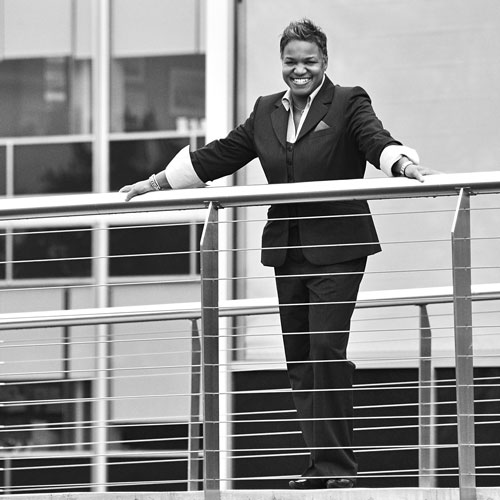Bryan Stroh wears so many hats on the job—perhaps all of them baseball caps. It’s fitting, since he guides the legal department at the Pittsburgh Pirates, a Major League Baseball (MLB) team, as senior vice president of business affairs and general counsel. While his title sounds straightforward, his duties intertwine legal and business with America’s favorite pastime. The trifecta enables him to weigh in on the sports organization’s latest venture: real estate development in North Shore, the area that surrounds the Pirates’ home ballpark, PNC Park, based in Pittsburgh, Pennsylvania.
While each “hat” pulls Stroh in several different directions throughout the day, he doesn’t mind. Rather, he’s grateful for the opportunity. “I’m fortunate enough that my role spans through three main buckets—legal, baseball, and business,” Stroh says. “My job is one part of this organization, and I absolutely rely on dozens of other people that work with me, and it’s certainly not a singular effort. I help manage and triage a lot of stuff, but I could not do it without a whole lot of other people.”
When it comes to timing, Stroh’s couldn’t have been more perfect. He joined the club in 2011, which meant he only suffered through two years of the Pirates’ twenty-season playoff drought. The Pirates reached the playoffs in 2013 and followed that playoff berth with consecutive appearances in 2014 and 2015.
“What makes me most excited is that we can have some control and some input in the highest and best use of the land . . . to try to complement our core business.”
“I wasn’t here for the twenty years of losing, so I kid all the time that the Pirates’ record since I’ve been here is way over .500,” Stroh says. “It’s funny, when we won the [MLB] Wild Card in 2013, I almost didn’t feel worthy because there were people in their organization who experienced so much heartache over the past twenty years—I almost felt like I hadn’t earned it to the same degree.” But Stroh says he still enjoyed seeing the city erupt in that game, adding that it was incredible to be a part of the moment when the built up energy and frustration of the last two decades came together for a victory.
Yet the legal end of Stroh’s job keeps him busy on its own. He oversees all of the team’s legal responsibilities that range from managing outside litigation, negotiating and drafting contracts with hundreds of different sponsors each season, and protecting the Pirates’ intellectual property, which means keeping third-parties from selling merchandise with the team logo on it.
“I’m just managing risk and trying to keep the company out of trouble, while also protecting our rights and our assets so that we can continue to maximize their value,” Stroh says. “I would imagine the legal part of my job is relatively similar to other in-house lawyers at similarly sized companies.”
As a self-described baseball geek, Stroh has been a fan of the game since childhood, and now he gets to call baseball his career. His legal expertise and baseball knowledge have put him in a position to negotiate many of the team’s contracts with the players and manage the salary arbitration process. He works in tandem with the team’s general manager, assistant general managers, and the club’s other baseball operations personnel on season-wide, baseball-related decisions. Stroh is not the final voice in these matters, but he loves being involved in the process.
Most general counsels don’t have much of a baseball function, so Stroh considers himself lucky. “It is a particularly good fit for me, given my love of the game, that I get work for some people that allow me to have a seat at the table,” Stroh says. “I’m certainly by no means a singularly trusted adviser—I’m not the one making the ultimate call—but our general manager [Neal Huntington] believes in having a lot of different viewpoints, and I’m fortunate enough that he thinks my viewpoint adds to the mix in the room.”
Still, perhaps the most unique portion of Stroh’s job is the one that doesn’t have much to do with baseball at all. When PNC Park was built in 2001, it opened in an area of Pittsburgh called North Shore. The Pirates, along with the National Football League’s Pittsburgh Steelers, were given incentives to try to develop the area around their respective stadiums. The Pirates didn’t pursue this opportunity aggressively until 2011 when Stroh and his boss (Pirates’ president Frank Coonelly, whom Stroh calls, “The best boss I have ever had and will ever have.”) realized it was in the franchise’s interest to get involved with the real estate development in the area.
For starters, the leadership team realized it made sense to be involved in what is around the ballpark because it plays into what is offered to their fans before and after games, according to Stroh. It also complements the products that the franchise would put on the field. Plus, the more entertainment options there are on the North Shore, the easier it would be to sell people to go see a game.
“I think what makes me most excited is that we can have some control and some input in the highest and best use of the land,” Stroh says. “We’re fortunate that we have an opportunity here. We have an opportunity to have a say in what’s going to go around the ballpark to try to complement our core business, which is a much better position to be in than a situation where ten to twenty years from now, people are asking, ‘Why is that there?’”
From getting to use his legal training to working for a professional baseball team to putting his stamp on the community’s development, Stroh has a tough time picking his favorite part about his job. At the end of the day, it’s just a privilege to work for an amazing organization.
“There is something really special about representing a public institution like the Pirates, something that is so forward and public facing,” Stroh says. “When people tell you they went to a Pirates game and had a great time and they love the Pirates, and you know you had just a little bit to do with that, it’s really rewarding to be a part of that.”

